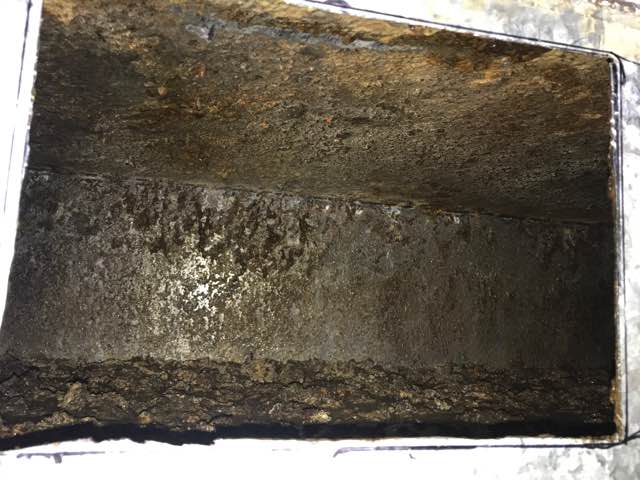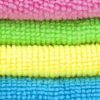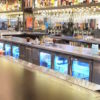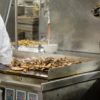Kitchen exhaust systems–depending on frequency of use and the type of cooking being done–require regular cleaning to remove grease, dust and other wastes. Combustible grease generates a fire hazard, and since cooking takes place right under the exhaust systems, it’s relatively easy for stovetop fires to spread to grease-clogged ducts. Access panels are critical to get to all the areas of ductwork for proper cleaning.
The National Fire Protection Association requires the regular cleaning of commercial kitchen hoods. Depending on your jurisdiction, there may be standardized time limits required for inspection and cleaning. However, the regulations clearly state that any system needs cleaning if the grease is evident or dripping on the grill, stove or floor. Busy kitchens using lots of fats and oils might need kitchen exhaust cleaner services more often than restaurants specializing in low-fat foods and vegetarian cuisines. Your hood cleaning service can advise you on the best cleaning regimen.

Regular Inspections and Cleaning
Kitchen hoods cleaning is important for safety reasons, for eliminating food odors and keeping the your hood working properly to remove smoke, recirculate air, reduce heat buildup, etc. Grease and dust can block airflow or damage the blades of exhaust fans. Grease can also increase the stress on fan motors, drive belts and bearings. Replacing or repairing a damaged kitchen hood can generate enormous expenses, but regular cleaning and maintenance can prevent these expenses, extend the life of the equipment and decrease the risk of fires and other safety risks in the home.
Local Regulations for Exhaust Systems
There are many regulations about commercial hood cleaning that could apply to your business. Proper cleaning might be necessary more often in commercial kitchens and restaurants with lots of deep fryers or kitchens where the cooks fry a lot of foods. Minimal standards must be met under the NFPA-96 Standard, and these include the design and capacity of the system and the system’s location in relation to cooking equipment. [1]
Accumulations of grease can damage the roofs of restaurants and commercial food businesses. Fortunately, Halo Restoration Services offers the right kind of service to detect and manage these problems proactively. Installing grease containment systems and emptying them regularly are ideal solutions for businesses that generate lots of grease.
Restaurant Hood Cleaning Chemicals
Hood cleaning chemicals, especially for commercial kitchens, are used to degrease ducts, fans, blades, grills, filters, floors and equipment. In commercial hood cleaning, the grease, chemicals and water must be collected and not allowed to run into city storm drains where it can pollute the water supply. Local jurisdictions might have further regulations about the types of cleaning chemicals appropriate to use.

Duct Access Guidelines
Depending on where you live, kitchen guidelines can vary considerably. That’s why it’s so important to find a local expert to advise you on hood safety and the best practices for cleaning and maintaining your exhaust system. The rules of providing access panels or doors are complex. Some of the relevant NFPA-96 codes include [2]:
- NFPA-96 4.1.8: This regulation requires that all parts of an exhaust system have access panels or doors to enable full cleaning of the system.
- NFPA-96 5.1.2: All areas of the system that channel grease and exhaust vapors must have a tight and continuous weld that’s watertight, and this external weld must continue to the lower part of the outermost perimeter of the hood.
- NFPA-96 7.3.1: Access panels must be located on the sides or tops of ducts–whichever area is more accessible–and where ducts change directions.
- NFPA-96 7.4.1.1: Horizontal ducts require a 20” by 20” opening to provide human access.
- NFPA-96 7. 4.1.2: If duct size doesn’t allow a 20” by 20” opening, an opening must be large enough to allow cleaning.
- NFPA-96 7.4.1.3: Openings on horizontal systems must be accessible by a 10-foot stepladder or a dedicated work platform.
- NFPA-96 7.4.2.2: If entry isn’t possible, suitable access for cleaning must be provided.
- NFPA-96 7.5.2.1: All seams, joints, connections and penetrations musty have a watertight continuous external weld.
Finding the Right Exhaust System Service in Your Area
The reasons for providing access panels or clean outs on kitchen exhaust systems are simple. Access enables better cleaning, easier inspections and faster repairs. It’s important to find a cleaning service in your area that understands the local and national regulations. In the Dallas/Fort Worth area of Texas and other northern Texas cities, Halo Restoration Services provides commercial cleaning services. The company understands what’s necessary for cleaning and maintaining all types of kitchen exhaust systems. Access doors are important for cleaning and safety, and after getting service for your exhaust hood, Halo’s service teams will ensure that the access panels are safely closed on a clean, efficient system.

References:
[1]: https://www.nfpa.org/codes-and-standards/all-codes-and-standards/list-of-codes-and-standards/detail?code=96 Nfpa.org: Standard for Ventilation Control and Fire Protection of Commercial Cooking Operations [2]: http://hamyarenergy.com/static/fckimages/files/NFPA/Hamyar%20Energy%20NFPA%2096%20-%202004.pdf Hamyarenergy.com



